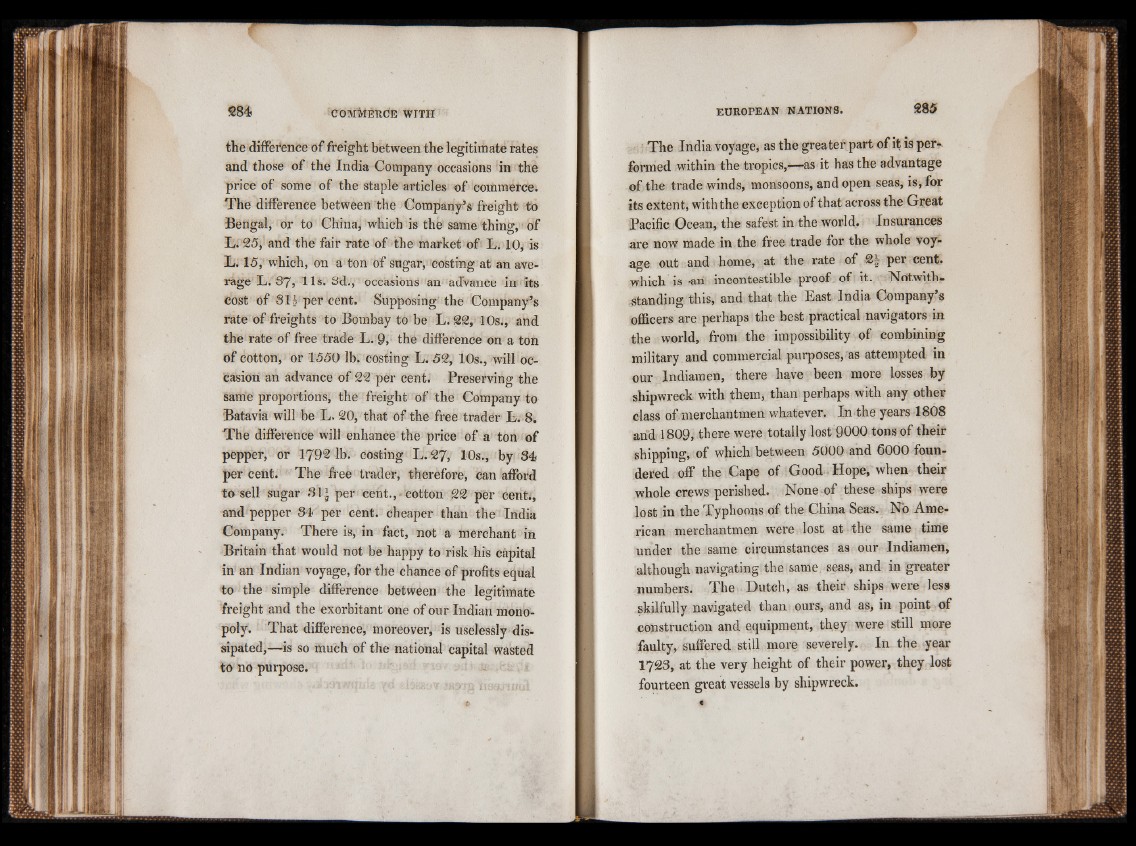
the difference of freight between the legitimate rates
and those of the India Company occasions in the
price of some of the staple articles of commerce.
The difference between the Company’s freight to
Bengal, or to China, which is the same thing, of
L. 25, and the fair rate of the market of L. 10, is
L. 15, which, on a ton of sngar, costing at an average
L. 37, 11s. 3d,, occasions an advance in its
cost of Simper cent. Supposing the Company’s
rate of freights to Bombay to be L. 22, 10s., and
the rate of free trade L. 9, the difference on a ton
of cotton, or 1550 lb. costing L. 52, 10s., will occasion
an advance of 22 per cent. Preserving the
same proportions, the freight of the Company to
Batavia will be L. 20, that of the free trader L. 8.
The difference will enhance the price of a ton of
pepper, or 1792 lb. costing L. 2 7, 10s., by 84
per cent. The free trader, therefore, can afford
to sell sugar 31* per cent.,-cotton 22 per centi,
and pepper 84 per cent, cheaper than the India
Company. There is, in fact, not a merchant in
Britain that would not be happy to risk his capital
in an Indian voyage, for the chance of profits equal
to the simple difference between the legitimate
freight and the exorbitant one of our Indian monopoly.
That difference, moreover, is uselessly dissipated,—
is so much of the national capital wasted
to no purpose.
The India voyage, as the greater part of it is performed
within the tropics,—as it has the advantage
of the trade winds, monsoons, and open seas, is, for
its extent, with the exception of that across the Great
Pacific Ocean, the safest in the world. Insurances
are now made in the free trade for the whole voyage
out and home, at the rate of -2|- per cent,
which is -an incontestible proof of it. Notwithstanding
this, and that the East India Company’s
officers are perhaps the best practical navigators in
the world, from the impossibility of combining
military and commercial purposes, as attempted in
our lndiamen, there have been more losses by
shipwreck with them, than perhaps with any other
class of merchantmen whatever. In the years 1808
arid 1809, there were totally lost 9000 tons of their
shipping, of which between 5000 and 6000 foundered
off the Cape of Good Hope, when their
whole crews perished. None of these ships were
lost in the Typhoons of the China Seas. No American
merchantmen were lost at the same time
under the same circumstances as our lndiamen,
although navigating the same, seas, and in greater
numbers. The Dutch, as their ships were less
skilfully navigated than ours, and as, in point of
construction and equipment, they were still more
faulty, suffered still more severely. In the year
1723, at the very height of their power, they lost
fourteen great vessels by shipwreck.